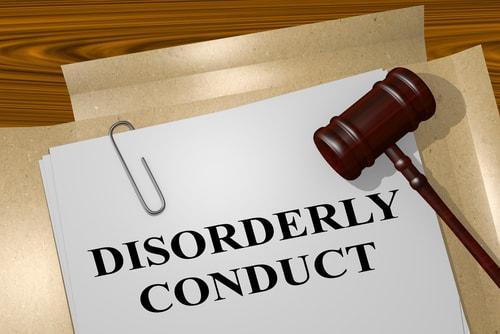What Is Disorderly Conduct?
 Disorderly conduct is a common crime that has recently come more into focus given the current rise in protests happening around the country. Any conduct that has the potential to disturb the peace can, in theory, qualify as disorderly, and if you are arrested or charged with an offense of this type, understanding it fully can make a difference in how it plays out.
Disorderly conduct is a common crime that has recently come more into focus given the current rise in protests happening around the country. Any conduct that has the potential to disturb the peace can, in theory, qualify as disorderly, and if you are arrested or charged with an offense of this type, understanding it fully can make a difference in how it plays out.
The Statute Is Vague
Illinois’ statute defines disorderly conduct as any behavior that is unreasonable and causes alarm or provokes a breach of the peace. This can encompass several different types of conduct and is often used as a catch-all of sorts for any behavior that is held to be somehow wrong or inappropriate without it being quite criminal enough to provoke a more specific charge. Numerous types of incidents would fall under disorderly conduct, such as domestic disputes without substantial injury, certain types of protest, public drunkenness, and the like.
If you are charged with disorderly conduct, the offense is considered a misdemeanor in all but the most unusual circumstances. Depending on your previous criminal record, you may be eligible for court supervision in your case, which is a non-conviction outcome, meaning that it would not show up as a criminal offense on your record in the first place. If supervision is denied, you may still be eligible for probation, but at worst, your sentence would be up to one year in jail for a misdemeanor, or between one and three years for a felony.
False Reports
One somewhat unusual aspect of disorderly conduct law that is in force in Illinois is the addition of false report charges under the umbrella of disorderly conduct. Unlike the ‘breach of the peace’ type disorderly conduct offenses, false reporting is considered quite serious and is more often charged as a felony, because of the potential harm to large groups of people. For example, calling in a false bomb threat is considered a Class 3 felony, punishable by a jail term of two to five years, as well as a fine up to $25,000, but because of its serious nature, those convicted of this offense might also be required to reimburse whatever public agency had to respond to the threat.
Be advised that while most disorderly conduct charges are misdemeanors aside from very serious false reports, sometimes it is possible to charge aggravated disorderly conduct. This will most often occur with people who have had an extensive criminal history, or if disorderly conduct is combined with, for example, a violent crime, but in theory, it is possible at the judge’s discretion. This makes it all the more important to be aware of the components of disorderly conduct so that any potential weakness in the case might be challenged.
Contact an Experienced Attorney
Disorderly conduct can be a charge that turns out to be nothing, or it can be a charge that has the potential to cause significant trouble for you later on. Either way, a knowledgeable attorney on your side can be a big help. The dedicated DuPage County disorderly conduct attorneys at the offices of Kathryn L. Harry & Associates, P.C. are happy to try and assist you with your case. Call our office today to set up an appointment.
Source:
http://www.ilga.gov/legislation/ilcs/fulltext.asp?DocName=072000050K26-1
 1200 Harger Road, Suite 830, Oak Brook, IL 60523
1200 Harger Road, Suite 830, Oak Brook, IL 60523







